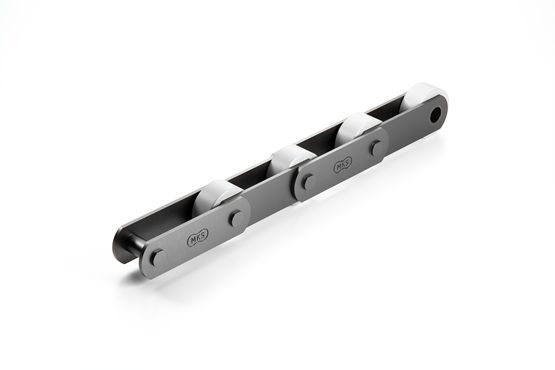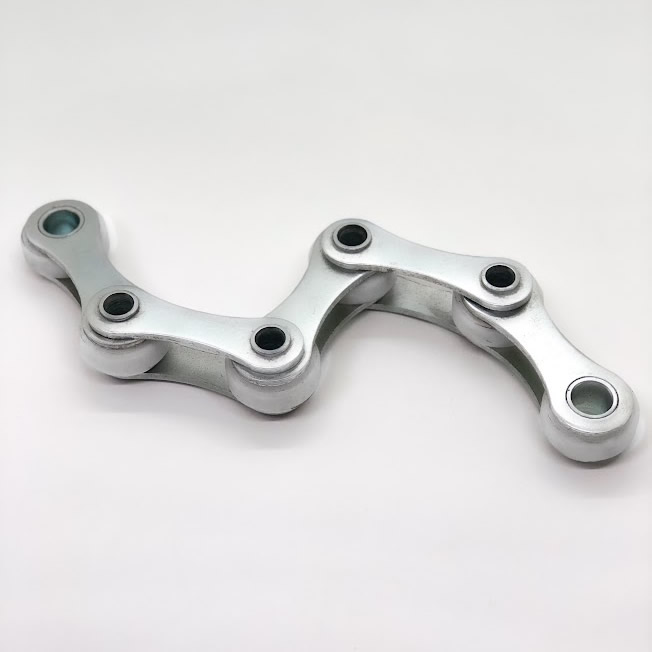CHAINS WITH PLASTIC ROLLERS

A plastic roller chain is a chain that uses the rolling motion of a roller to reduce noise and vibration. These chains are used where noise is not desired in systems with light loads and delicate transport is required. Plastic roller chains have an inner steel core and an outer sleeve made from high-tensile-strength plastic.
In order to reduce noise, the plastic sleeve has grooves or other features that help to absorb the energy created by rolling movement. The grooves also help to distribute weight evenly across the entire length of the roller, giving it more strength than a standard smooth chain. Learn what is a plastic roller chain and more here!
What Are Chains With Plastic Rollers?
Chains with plastic rollers are mechanical devices widely used in industrial and commercial applications. They consist of plastic rollers mounted on chain links, providing smooth and efficient material handling. These chains are particularly effective in conveyor systems, automated production lines, and various material transportation systems. The plastic rollers help reduce friction and noise, making them an ideal choice for industries where quiet and smooth operation is crucial, such as food processing, pharmaceuticals, and electronics. Moreover, the plastic rollers are resistant to corrosion, making them suitable for environments with moisture or exposure to chemicals.
What is the Purpose of Chains With Plastic Rollers?
The primary purpose of chains with plastic rollers is to facilitate the movement of materials from one point to another in an efficient, safe, and controlled manner. These chains are commonly used in conveyor belts, automated systems, and industrial production lines. The roller mechanism allows for smoother transportation of heavy loads with less energy consumption, thanks to the reduced friction between the chain and the track. Additionally, chains with plastic rollers operate more quietly than metal ones, making them particularly popular in industries where noise levels must be kept to a minimum. They also withstand harsh conditions and prevent damage caused by moisture, chemicals, or other environmental factors.
What are the Models of Chains With Plastic Rollers?
Chains with plastic rollers come in a variety of models, tailored to suit different needs and applications. These models vary based on the size of the chain, the diameter of the rollers, the width of the chain links, and the type of plastic material used. For lighter loads, smaller rollers and chain links are generally sufficient, whereas larger rollers are preferred for handling heavier loads. Additionally, different models are available depending on the speed of the production line and the weight of the materials being transported. From automotive production to agricultural machinery, these chains offer versatile solutions for various industrial sectors.
What Are the Advantages and Disadvantages of Chains With Plastic Rollers?
Chains with plastic rollers provide several advantages, such as their lightweight design, energy efficiency, and quiet operation. Additionally, their resistance to corrosion makes them highly durable in humid or chemically active environments. However, like all materials, plastic chains also have some disadvantages. For instance, they may not perform well in extremely high-temperature environments, where plastic may degrade or lose its structural integrity. Furthermore, under very heavy loads, plastic chains may not offer the same level of durability as metal chains. It is essential to choose the appropriate model according to the specific requirements of the application.
Benefits and Usage Areas of Chains with Plastic Rollers
These chains are typically used in small industrial applications such as conveyor belts, storage bins, and machinery parts (such as gears).
The benefits of chains with plastic rollers include:
– The low noise level of these chains makes them ideal for use in sensitive environments, such as hospitals and laboratories where quiet operation is necessary.
– If your application areas are required to be silent, chains with plastic rollers are the most suited types of chains as their noise level is comparatively low.
– Chains with plastic rollers are lightweight, making them easy to transport and install.
The usage areas of plastic roller chains widely differ from each other. The span goes from food processing to medical equipment where sensitive materials are being handled. They’re ideal for harsh chemical and temperature environments, and they self-lubricate—making them perfect for clean rooms or other situations where cleanliness is important.
Plastic chains have been developed for light-duty power transmission applications. They can be used with steel or plastic sprockets and perform in a wide variety of speeds.

What Should Be Considered When Choosing a Chain With Plastic Rollers?
When selecting chains with plastic rollers, several factors need to be taken into account. First, the environmental conditions where the chain will be used are crucial. For instance, if the chain is used in a humid or chemically active environment, it is important to ensure that the plastic material is resistant to corrosion and chemical degradation. The weight of the load to be transported is another key factor. Lighter loads can use smaller rollers, but heavier loads require larger, more durable rollers. If the chain is to be used in a fast production line, it must be wear-resistant and minimize friction. Ensuring these factors are met will help optimize performance and extend the chain’s lifespan.
Maintenance Of Chains with Plastic Rollers
Maintenance and lubrication are crucial in the overall performance and life span of the roller chain. Proper lubrication will reduce abrasion, chain wear, friction, and noise and keep chains running cooler at higher RPMs.
The most common cause for a roller chain to wear out is abrasive contact with the ground surface. The failure of the entire system is one of the risks that may come true if the severity of the contact increases.
A high-quality lubricant is vital to prevent this. This includes those areas where contact with other objects occurs (such as parking lot surfaces). If you live in out of the ordinary conditions, it might be a good idea to do regular inspections to make sure that everything is alright.
In Which Industries Are Chains With Plastic Rollers Used?
Chains with plastic rollers are used across various industries due to their durability, versatility, and efficient material handling capabilities. In the automotive industry, they are employed in assembly lines and conveyor systems to move components efficiently. Food and beverage industries rely on these chains for transporting goods under hygienic conditions, as the plastic material is easier to clean and resistant to moisture. In pharmaceutical production, where contamination control is critical, the smooth and quiet operation of these chains is a significant advantage. Agricultural machinery and electronic manufacturing sectors also utilize chains with plastic rollers for handling materials in harsh or sensitive environments.
How to Maintain and Repair Chains With Plastic Rollers?
Proper maintenance is essential to ensure that chains with plastic rollers function efficiently and last longer. Regular cleaning prevents the buildup of dust, dirt, and other debris that could hinder the smooth operation of the rollers. Periodic lubrication reduces friction and wear, prolonging the life of the chain. However, it is important to use lubricants that are compatible with plastic materials to avoid damaging the rollers. In cases where wear or damage occurs, it is crucial to replace the worn-out parts promptly to prevent further issues. Regular inspection of the chain tension and the condition of the rollers ensures optimal performance and prevents breakdowns.
What Are the Prices of Chains With Plastic Rollers in 2024?
As of 2024, the prices of chains with plastic rollers vary depending on the type of material used, the length of the chain, and the diameter of the rollers. Market demand and fluctuations may also affect pricing throughout the year. However, generally speaking, chains with plastic rollers are more cost-effective compared to metal chains, particularly in terms of long-term maintenance and energy efficiency. The price range can vary significantly between different manufacturers and quality levels, but overall, these chains offer a budget-friendly solution for industries looking for durable and efficient material handling systems.
What Are the Sizes of Chains With Plastic Rollers?
The sizes of chains with plastic rollers differ based on the application and the load-carrying capacity. Typically, the diameter of the rollers and the width of the chain links are determined by the size and weight of the materials being transported. Smaller chains are used for light-duty applications, while larger chains are employed for heavy-duty industrial processes. The length of the chain may also be adjusted to fit the specific requirements of the production line or conveyor system. Selecting the correct chain size is crucial to ensure optimal performance, minimize wear and tear, and maintain the overall efficiency of the system.
Is there any performance issue with Chains with Plastic Rollers?
Plastic roller chains are used as multi-row on transfer conveyors. This application is ideal to transport sensitive products in the places where the conveyor must be used. Rubber roller chains are used to transport goods that shouldn’t be scratched like plated or thin sheet metal, dyed wood plates, roof tiles, or polished pipes. Also, it’s possible to produce these chains as steel-plated without sticking rubbers.
Plastic roller chains can be manufactured in different thicknesses and lengths by using different types of plastic rollers. Plastic rollers have high hardness and they do not easily crack or break down when used in high temperatures. As a result, plastic roller chains can be made with excellent wear resistance and can also be processed very quickly. Plastic rollers also have a long life span. This allows you to make the most out of your product while, keeping the costs to a minimum at the same time.
Plastic roller chains are used as a single row on transfer conveyors due to their easy installation process, low maintenance cost, and long life span. It is also less expensive than rubber roller chains because there is no need to use any glue or other adhesive compounds during the assembly process which greatly reduces production costs for plastic roller chain manufacturers worldwide.
Discover more about the chains with plastic rollers at Makelsan and get the tailored service you need for your industry from the “MAKELSAN CUSTOM MADE CHAINS CATALOG”
Chains with Plastic Roller FAQ
Chains with plastic rollers are durable because they’re made to last. The fact that they are made of plastic makes them advantageous against bulky and metal chains. Thanks to their lightweight design, it’s pretty easy to handle and transport. Plastic drive chain products are also economical, which means you’ll save money by using this type of product instead of others. It can be used in conveyance applications where you need a lightweight, flexible chain with a wide range of motion and durability. A nylon drive chain is one option to consider for this use.
The fact that these types of chains are lightweight, flexible, and easy to install make them a popular choice amongst other chains as well. The fact that nylon is affordable makes it a great choice for any business. Chains with plastic rollers are durable, and they are durable at the same time however they are expected to wear out over time, especially if you’re using them for a conveyance application.
Plastic roller chain materials include plastic rollers, sprockets, and side plates made from nylon or acetal. They can also be used with steel or plastic sprockets. When they are used with a steel sprocket, they perform well at high speeds.
Plastic roller chains have many advantages over other types of chains. They are very light. This means that they do not add extra weight to your equipment or slow it down when compared to metal rollers.
Plastic roller chains are resistant to high temperatures and chemicals. What makes it possible is that they’re made of a special plastic material. This material is also impact resistant, so it can’t be easily damaged by collisions with other objects or impacts on the ground. And because plastic roller chains are so light, they don’t require much of a load to operate at their full capacity—so you won’t have to worry about reduced performance in high-load situations.
In addition to being lightweight and durable, plastic roller chains can be used with steel or plastic sprockets, work under a wide range of speeds and loads, and excel in harsh chemical environments. The life of a nylon sprocket is dependent on its oil level. Generally, the life of an oil-filled nylon sprocket is dependent on how well-maintained it is. You should check all of the parts for signs of wear, corrosion, and so forth before you change one part of the chain.
Chains with plastic rollers function by combining the traditional strength of chain links with the smooth motion facilitated by plastic rollers. The chain links form the backbone, providing the strength and structure needed for material handling or transmission of mechanical power. The plastic rollers, mounted on the chain, reduce friction as the chain moves along a track or conveyor system, allowing for smoother and more energy-efficient operation.
As the chain moves, the plastic rollers rotate along the surface, minimizing wear and tear between the chain and the track. This design not only reduces friction but also cuts down on noise, which is especially important in industries where quiet operation is essential. The plastic material of the rollers is often resistant to moisture and corrosion, making these chains suitable for wet or chemically active environments. Overall, these chains are designed to improve the efficiency, durability, and smoothness of material handling systems across a wide range of industries.
Determining the correct size for your chain with plastic rollers depends on several factors, including the load you intend to transport, the operational speed of the system, and the environmental conditions. Here’s how you can figure out the appropriate size:
- Load Capacity: The weight of the material or goods being transported is the most critical factor. Chains with plastic rollers come in different sizes and strengths, so you’ll need a chain that can handle the load without deforming or breaking. Lighter loads can use smaller chains, while heavier loads require chains with larger rollers and stronger links.
- Roller Diameter: The diameter of the plastic rollers impacts the chain’s efficiency in reducing friction. Larger rollers are better suited for heavier loads, as they can distribute the weight more evenly, while smaller rollers work well for lighter tasks.
- Chain Link Width: The width of the chain links should correspond to the size of the rollers and the width of the track or conveyor system. Wider links are usually paired with larger rollers for more robust applications.
- Environmental Factors: If the chain will be used in harsh environments, such as areas with extreme temperatures or high humidity, selecting a chain with plastic rollers that are resistant to such conditions is crucial. The size and material composition should align with the specific conditions of the application.
Consulting the manufacturer’s guidelines or product specifications can also help you determine the correct chain size based on your system’s requirements.
Proper maintenance and timely repair are essential to prolong the life and ensure the efficient operation of chains with plastic rollers. Here are the key maintenance and repair steps:
- Regular Cleaning: Chains with plastic rollers can accumulate dirt, dust, and other debris during operation, which can impact their performance. Regular cleaning is essential to remove these particles and maintain smooth operation. Depending on the environment, chains may need to be cleaned daily, weekly, or monthly. For example, in the food industry, where hygiene is a priority, more frequent cleaning is required.
- Lubrication: While plastic rollers typically reduce friction, lubrication can further enhance performance and prolong the life of the chain. Make sure to use lubricants that are compatible with the plastic material. Some oils or greases can degrade plastic, so it’s important to follow the manufacturer’s recommendations. Lubrication should be applied regularly to the rollers and chain links to minimize wear and friction.
- Inspect for Wear and Damage: Periodically inspect the chain and rollers for signs of wear, such as cracks in the plastic rollers, elongated chain links, or corrosion (if present). If any damage is detected, it’s crucial to replace the affected parts promptly to prevent further degradation or system breakdown.
- Tension Adjustment: Ensure that the chain is properly tensioned. Over time, the chain may stretch or become loose, which can reduce its efficiency and lead to damage. Adjust the tension according to the system’s needs, making sure it is neither too tight (which can cause strain) nor too loose (which can lead to slippage or malfunction).
- Replace Worn Parts: If the plastic rollers or chain links show significant wear, replace them as part of the routine maintenance. Delaying the replacement of worn components can lead to further damage, increased operational downtime, and potentially costly repairs.
By following these maintenance steps, you can ensure that your chains with plastic rollers continue to function efficiently and have a longer lifespan.


